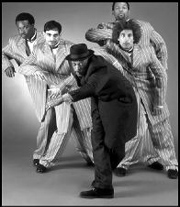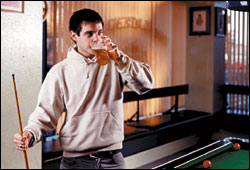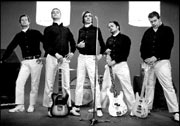LEGENDS OF HIP-HOP
On the Boards, 100 W. Roy St., 206-217-9888, $12-$25 8 p.m. Thurs., Nov. 21-Sun., Nov. 24
WHAT WITH EMINEM’S 8 Mile breaking both box office and Billboard records, hip-hop appears to be enjoying a major national moment. But the hip-hop championed by 39-year-old choreographer Lorenzo “Rennie” Harris has very little to do with a twentysomething white boy from the wrong side of the Detroit tracks, and everything to do with a culture, a people, and, as his dance company’s name implies, a PureMovement decades in the making. Three years after selling out a run at On the Boards with his own troupe, Harris now returns there as emcee with The Legends of Hip-Hop, a dance performance celebrating the evolution of the art form with godfathers Don Campbell, Electric Boogaloos, the Untouchables, and more. The Weekly spoke with him by phone in his hometown of Philadelphia about heritage, Harvard, and the art of sharing.
Seattle Weekly: What are your own first memories of hip-hop culture?
Rennie Harris: Well, to be honest, when I was really young, it wasn’t called hip-hop—it was just part of the culture. It wasn’t something that was distinctive. Like right now, there are things going on around you in your society—in your culture, in your neighborhood, in your community—that have no definition, but it’s going on, and you’re not thinking of it as anything other than part of the community. There’s really no beginning or ending. It wasn’t until about 1980 that they actually started calling it hip-hop.
It seems like it’s pretty important to you to preserve the history and the legacy of hip-hop, but how do you feel about its future?
I think the same thing is gonna happen—you create things, it hits and becomes very popular, and as it becomes popular, it becomes institutionalized, then kind of whitewashed, so to speak, and then something else is created. It’s a cycle that continues—same thing happened with rock ‘n’ roll and rhythm and blues. Same thing happened with jazz. Jazz is being taught now at Harvard. I still can’t understand how they teach improvisation, but it’s something they just do.
Is it strange to play a predominantly white town like Seattle as opposed to maybe your hometown, along the East Coast, or in L.A.?
No, actually our audience is 99 percent white everywhere we go. And I’m fine with that, because I love that about black people—that they never really own too much, they just create it and let it go. Some people get upset that black people are not in the audience supporting hip-hop, but [black people] are not gonna pay for it. Why should they pay for it when they are it? I mean, you got to understand something: Hip-hop is not something you go to school to learn. It comes from a culture. So if it comes from a specific culture, it is something that is lived. People who are not from that culture have to learn about it, but the problem is that when people go to school, they assume that because they went to school for it, they know it. But you don’t really know anything until you experience it, because everything else is just on paper. Like, I can’t go to France—even if I studied French all my life—and know it, because there are some things I can never fully understand without knowing the collective consciousness of the people. You’re just a guest.
Your group does a lot of seminars, especially with kids, when you tour. Is it important for what you do to be something more interactive?
Well, I don’t really look at myself as performing—ever. I look at myself as sharing with people. If I looked at myself as an entertainer, then I think I would quit. Because Americans always want to be entertained and be spoiled, but when you create this kind of entertainment, you create a hierarchy—you keep one part of the audience in the dark, and then you’re in the light and you have all the attention. But in traditional culture—the African-American culture, Latino culture, Irish culture, Italian culture—they don’t get up on the stage. They all share it, they’re all part of it—the old dance and the young dance, you know what I mean? And that’s really where all the quote- unquote arts come from, from the cultures of people—and if that’s the case, now that I’m on a stage, why do I have to perform for you? Why couldn’t it continue to be the circle? In my mind, I have to look at it like, “I’m sharing a little bit of my culture with you, and we’re gonna celebrate.”









